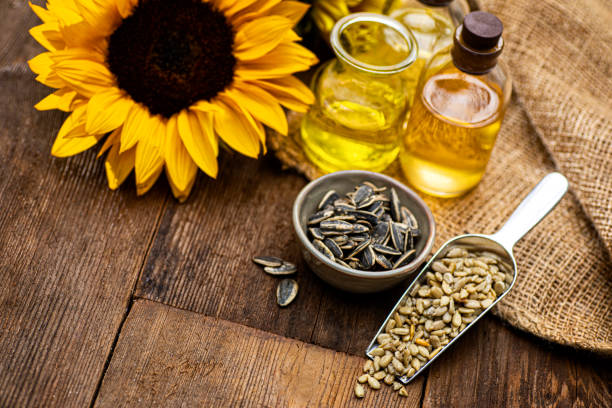Introduction to Sunflower Oil
Sunflower oil, with its radiant hue and multifaceted utility, has transcended its origins to become a staple in kitchens worldwide. Its journey through history is rich, evolving from a humble crop to a culinary and nutritional powerhouse.
Historical Background and Origins
Originally cultivated by indigenous tribes in North America, sunflowers made their way to Europe in the 16th century. The oil extracted from sunflower seeds gained popularity for its diverse uses and health benefits.
Composition and Nutritional Value
Sunflower oil boasts a composition rich in monounsaturated and polyunsaturated fats, along with essential vitamins such as Vitamin E and K. Its nutritional profile contributes to its recognition as a heart-healthy option in cooking.
Culinary Uses of Sunflower Oil
Cooking Applications and Benefits
Sunflower oil's adaptability in the kitchen extends beyond its high smoke point. Its ability to evenly distribute heat makes it an excellent choice for frying, contributing to crispy textures while maintaining the moisture within foods. Furthermore, its neutral taste doesn't overpower the natural flavors of ingredients, making it a preferred option in dressings, marinades, and sauces.
High Smoke Point: Ideal for Various Cooking Techniques
One of the significant advantages of sunflower oil is its high smoke point, typically around 450°F (232°C). This attribute allows it to retain its nutritional integrity even at high temperatures, preventing the release of harmful compounds and ensuring that foods are cooked to perfection without a burnt taste.
Flavor Profile and Versatility in Dishes
While some oils carry a distinct taste that can alter the essence of a dish, sunflower oil remains subtle, letting the primary flavors shine through. It's a versatile companion, effortlessly blending with diverse cuisines, whether used in Mediterranean-style dishes, Asian stir-fries, or baking pastries and cakes.
Read More :- 8 Astonishing Benefits Of Using Sunflower Oil
Health Benefits
Heart-Healthy Properties
Research indicates that the monounsaturated and polyunsaturated fats present in sunflower oil help lower bad cholesterol levels (LDL) while promoting good cholesterol (HDL), thereby reducing the risk of heart diseases when consumed as part of a balanced diet.
Vitamin Content and Antioxidant Effects
The high concentration of Vitamin E, a powerful antioxidant, offers protective effects against oxidative stress. Regular consumption may contribute to improved immune function, skin health, and overall well-being.
Impact on Skin and Hair Health
Beyond its role in cooking, sunflower oil is a natural emollient that assists in maintaining the skin's moisture and strengthening hair strands. When applied topically, it helps in combating dryness, inflammation, and signs of aging, promoting a healthy glow and lustrous hair.
Sustainability and Production
Sustainable Farming Practices
Sustainable agriculture practices, including crop rotation and minimal chemical use, are embraced by many sunflower oil producers. These efforts not only reduce the environmental impact but also promote soil health and biodiversity.
Extraction Methods and Production Process
The extraction process involves pressing the sunflower seeds to obtain oil, often using mechanical means or cold-pressing to preserve its natural properties. This method ensures minimal alteration to the oil's composition, retaining its nutritional value.
Environmental Impact and Considerations
Continuous efforts in the industry focus on reducing waste and energy consumption during production. Some companies invest in eco-friendly packaging and collaborate with local communities to enhance environmental stewardship.
Choosing the Right Sunflower Oil
Varieties Available in the Market
Consumers can explore various types of sunflower oil, such as refined, unrefined, high oleic, and organic options. Each variant caters to specific culinary needs, preferences, and health considerations.
Factors to Consider While Purchasing
When selecting sunflower oil, factors like the intended use, smoke point, and flavor profile should guide your choice. Refined oils might suit high-heat cooking, while unrefined versions preserve more of the natural flavors.
Understanding Labels and Certifications
Labels indicating organic, non-GMO, or cold-pressed methods empower consumers to make informed decisions aligned with their values and health objectives.
Conclusion
The luminous presence of sunflower oil in culinary spaces transcends its vibrant appearance; it illuminates dishes with nutritional richness and culinary finesse. Embracing this golden elixir not only elevates the flavors of meals but also contributes to a healthier lifestyle.
To get more details about our products contact us now!!!!!


Comments
Post a Comment